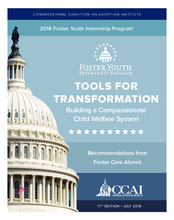Displaying 211 - 220 of 513
The objective of this study was to determine if a school support intervention for adolescent orphans in Kenya had effects on mental health, a secondary outcome.
The study addresses the needs of Scottish kinship carers of teenage children who have been identified as being in need of extra support.
CCAI’s Foster Youth Internship Program® is a highly esteemed congressional internship for young adults who spent their formative years in the U.S. foster care system. In this annual policy report, the interns focus on subjects they are personally passionate about due to their experiences and understanding after living in foster care and make personal recommendations for improving the U.S. foster care system.
This chapter will critically examine the difficulties faced by young people who are looked after by local authorities in accessing mental health services and argue, based on findings of recent Serious Case Reviews that there has never been a more dangerous time to be a looked-after child.
The authors of this paper sought to explore the psychometric properties and validity of the Achenbach Youth Self-Report and Child Posttraumatic Stress Disorder Symptom Scale among orphans and vulnerable children (OVC) living in Lusaka, Zambia.
In this study, the authors sought to identify sleep habits and suspected sleep disorders among abused children and adolescents admitted to residential care facilities in Japan and to investigate their association with emotional and behavioral problems.
This paper reviews the development, behavioral, and mental health needs of children in foster care.
This study had two purposes; first to examine mental health disparities among LGBTQ youth and their heterosexual peers who are involved in the child welfare system, and second to observe the effectiveness of systems of care with youth in child welfare and if any differences exist between LGBTQ youth and heterosexual youth.
This study examines the mental health of adolescents living with HIV (ALHIV) in Namibia, and the factors that contribute to mental health problems.
This thesis took on a meta-analytical approach to examine sources of heterogeneity between studies evaluating the effect of foster care on adaptive functioning, cognitive functioning, externalizing behavior, internalizing behavior, and total problems behavior.


